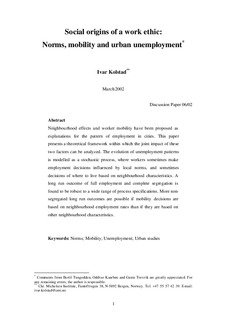Social origins of a work ethic : norms, mobility and urban unemployment
Working paper
Permanent lenke
http://hdl.handle.net/11250/162910Utgivelsesdato
2002-03Metadata
Vis full innførselSamlinger
- Discussion papers (SAM) [657]
Sammendrag
Neighbourhood effects and worker mobility have been proposed as
explanations for the pattern of employment in cities. This paper
presents a the oretical framework within which the joint impact of these
two factors can be analyzed. The evolution of unemployment patterns
is modelled as a stochastic process, where workers sometimes make
employment decisions influenced by local norms, and sometimes
decisions of where to live based on neighbourhood characteristics. A
long run outcome of full employment and complete segregation is
found to be robust to a wide range of process specifications. More nonsegregated
long run outcomes are possible if mobility decisions are
based on neighbourhood employment rates than if they are based on other neighbourhood characteristics.
Utgiver
Norwegian School of Economics and Business Administration. Department of EconomicsSerie
Discussion paper2002:6
